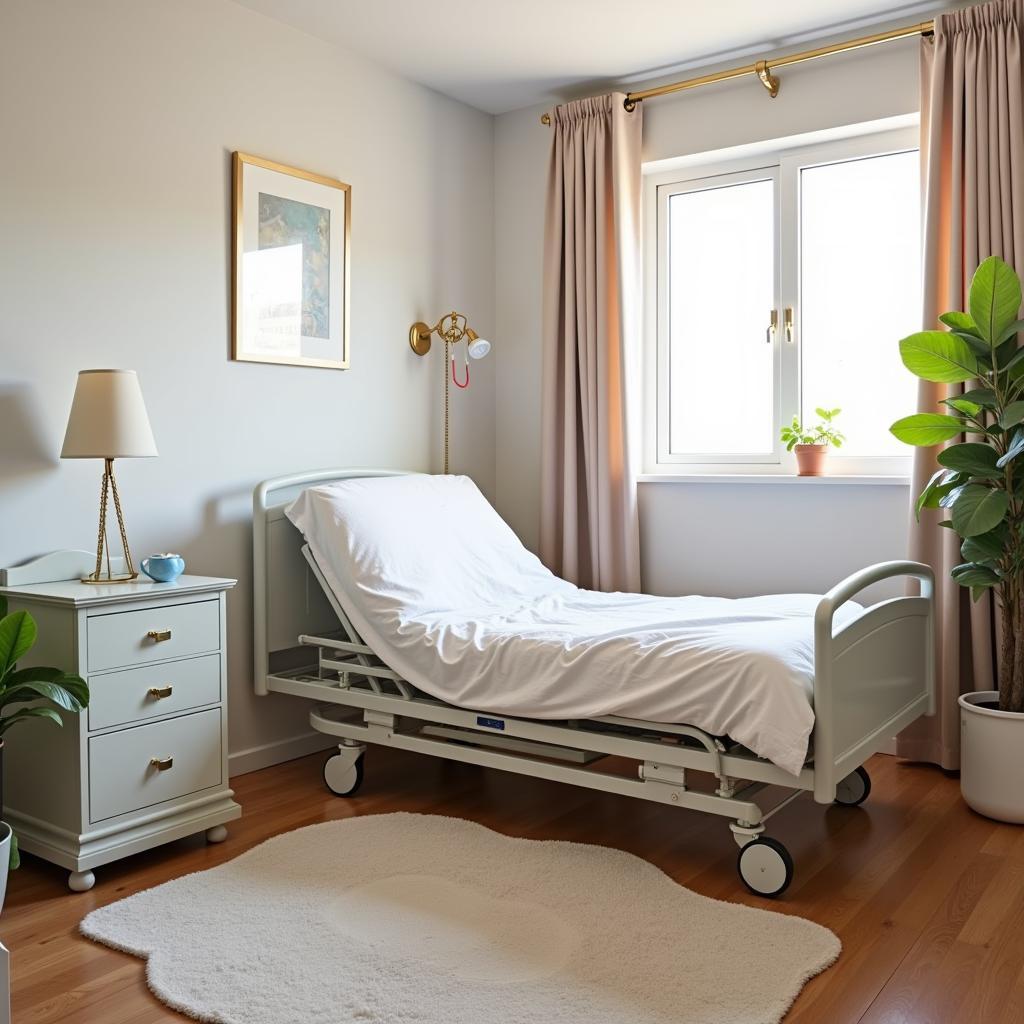Understanding Who Buys Hospital Beds is crucial for manufacturers, suppliers, and healthcare professionals alike. This guide explores the diverse market for hospital beds, examining the various buyers, their specific needs, and the factors influencing their purchasing decisions.
The Diverse Landscape of Hospital Bed Buyers
The market for hospital beds isn’t limited to hospitals. A wide range of institutions and individuals require these specialized pieces of equipment. From large healthcare systems to individual home care settings, the demand for hospital beds is constantly evolving.
Hospitals and Healthcare Systems
Hospitals are the most obvious purchasers of hospital beds, representing a significant portion of the market. They require beds for various departments, including intensive care units (ICUs), emergency rooms, and general patient wards. Their purchasing decisions are often influenced by factors such as patient comfort, durability, infection control, and integration with existing medical technology.
Nursing Homes and Long-Term Care Facilities
Nursing homes and long-term care facilities also constitute a substantial market for hospital beds. These facilities require beds designed for residents with varying mobility levels and medical needs. Features like adjustable height, side rails, and pressure-relieving mattresses are essential considerations for these buyers. They often prioritize beds that enhance resident comfort and safety while minimizing the risk of pressure sores.
Home Healthcare Providers and Individuals
The demand for hospital beds in home healthcare settings is steadily growing. Individuals recovering from surgery, managing chronic conditions, or requiring palliative care often benefit from the comfort and functionality of a hospital bed at home.  Hospital bed setup in a home care environment Home healthcare providers and individuals purchasing beds for home use often prioritize affordability, ease of use, and portability.
Hospital bed setup in a home care environment Home healthcare providers and individuals purchasing beds for home use often prioritize affordability, ease of use, and portability.
Factors Influencing Purchasing Decisions
Several factors influence the decision-making process when purchasing hospital beds. Understanding these factors is crucial for both buyers and sellers.
Budgetary Constraints
Cost is a significant factor for all buyers, especially smaller healthcare facilities and individuals. While high-end beds offer advanced features, budget-conscious buyers often seek cost-effective solutions that meet essential needs.
Patient Comfort and Safety
Patient comfort and safety are paramount considerations. Beds that offer pressure relief, adjustable positioning, and secure side rails are essential for preventing pressure sores, falls, and other complications.
Infection Control
Infection control is a critical concern in all healthcare settings. Hospital beds made with easy-to-clean materials and antimicrobial properties are highly desirable.
Technological Integration
Integrating hospital beds with existing medical technology is becoming increasingly important. Beds with compatible monitoring systems and electronic controls enhance patient care and streamline workflow.  Hospital bed with integrated technology
Hospital bed with integrated technology
Key Considerations for Different Buyers
Different buyers have unique needs and priorities. Understanding these nuances is crucial for effectively serving the market. For example, a hospital might prioritize advanced features and integration with their existing systems, while an individual might focus on affordability and ease of use.
“When selecting a hospital bed, it’s crucial to consider the specific needs of the patient or resident,” says Dr. Emily Carter, Chief Medical Officer at San Jose Hospital. “Factors such as mobility, medical condition, and overall comfort should be carefully evaluated.”
Conclusion
The market for hospital beds is diverse and dynamic. From large hospitals to individual home users, the demand for these essential pieces of equipment continues to grow. By understanding the various buyers, their specific needs, and the factors influencing their decisions, manufacturers and suppliers can effectively meet the demands of this evolving market. Choosing the right hospital bed can significantly impact patient care, comfort, and overall well-being. Remember to consider the factors discussed in this guide when making your purchasing decision.
FAQ
- What is the average lifespan of a hospital bed?
- Are there financing options available for purchasing hospital beds?
- What are the different types of hospital bed mattresses?
- How often should a hospital bed be serviced?
- What are the weight limits for hospital beds?
- Are there rental options for hospital beds?
- What safety features should I look for in a hospital bed?
“Investing in a high-quality hospital bed can significantly improve patient outcomes and reduce the risk of complications,” adds Dr. Michael Davis, Head of Nursing at San Jose Hospital.
Need More Information?
Explore our website for more detailed information on hospital beds and other medical equipment. You can also contact us directly for personalized assistance.
For immediate assistance, please contact us:
Phone: 02437655121
Email: [email protected]
Address: Số 298 Đ. Cầu Diễn, Minh Khai, Bắc Từ Liêm, Hà Nội, Việt Nam.
Our customer service team is available 24/7.